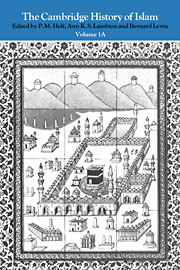2 - Muhammad
from Part I - The rise and domination of the Arabs
Published online by Cambridge University Press: 28 March 2008
Summary
For the occidental reader there are grave difficulties in attaining a balanced understanding of the historical role of Muhammad. The most serious of these is that the dominant conception of religion as a private and individual matter leads men to expect that a religious leader will be a certain kind of man; and it is disconcerting to find that Muhammad does not conform to this expectation. He was undoubtedly a religious leader; but for him religion was the total response of his personality to the total situation in which he found himself. He was responding not merely to what the occidental would call the religious and intellectual aspects of the situation, but also to the economic, social and political pressures to which contemporary Mecca was subject. Because he was great as a leader his influence was important in all these spheres, and it is impossible for any occidental to distinguish within his achievement between what is religious and what is non-religious or secular.
Another difficulty is that some occidental readers are still not completely free from the prejudices inherited from their medieval ancestors. In the bitterness of the Crusades and other wars against the Saracens, they came to regard the Muslims, and in particular Muhammad, as the incarnation of all that was evil, and the continuing effect of the propaganda of that period has not yet been completely removed from occidental thinking about Islam. It is still much commoner to find good spoken about Buddhism than about Islam.
- Type
- Chapter
- Information
- The Cambridge History of Islam , pp. 30 - 56Publisher: Cambridge University PressPrint publication year: 1977
References
- 2
- Cited by

